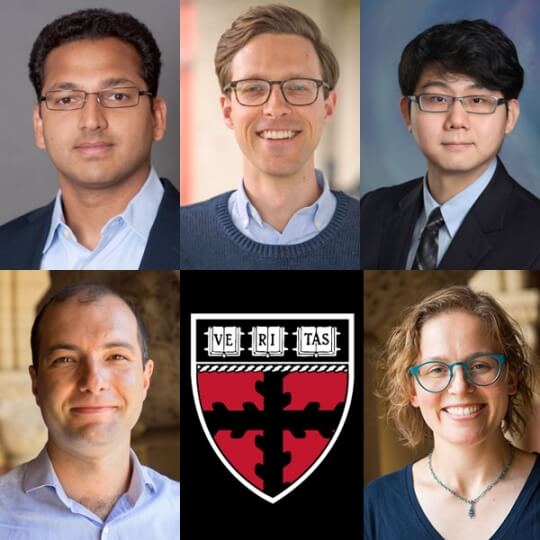News
The Harvard John A. Paulson School of Engineering and Applied Sciences (SEAS) is welcoming five distinguished researchers to the ranks of its faculty. The new faculty bring a range of expertise from advanced materials for biological and biomedical applications to high-performance computing, theoretical and computational neuroscience, land-atmosphere interface modeling for water resource management, weather prediction and climate modeling and human-computer interaction.
“The wide range of talents, perspectives, and intellectual approaches that these new colleagues bring to the SEAS faculty are wonderful complements to the interdisciplinary ethos of teaching and research at our School,” said Frank Doyle, the John A. Paulson Dean. “We look forward to their contributions to our mission to address global challenges and serve society.”
The new faculty include:
Jia Liu, Assistant Professor of Bioengineering (as of January 1, 2019). Liu’s research explores new types of materials and devices as bioelectronics for biological and biomedical applications. He is interested in exploring advanced nanoelectronics/photonics, polymer chemistry, tissue engineering and genome engineering to seamlessly integrate man-made devices with living systems for understanding, controlling and, ultimately, enhancing the performance of biological systems through the tissue-electronics interface. At SEAS, his first research focus will be on the development of bioelectronics for mapping and controlling single-cell activities from a statistically significant amount of cells across the entire brain and heart in behaving animals with cell-type specificity.
Liu earned his B.S. degree from Fudan University in China in 2009 and his Ph.D. degree from Harvard University in 2014, where he studied with Charles M. Lieber, the Joshua and Beth Friedman University Professor. He then moved to Stanford University in 2015 to complete a postdoctoral fellowship with Zhenan Bao, Karl Deisseroth and Anson Lee.
Vijay Janapa Reddi, Associate Professor in Electrical Engineering (as of January 1, 2019). Reddi is interested in building high-performance and energy-efficient computer systems. He specializes in computer architecture solutions for mobile computing, such as smartphones and wearables, autonomous agents, such as ground service robots and UAVs, and solutions for cloud computing and the Internet of Things (IoT). His approach focuses on breaking through the traditional layers of abstraction at the hardware and software interfaces, and co-designing the system from programming languages down to the bits and gates to achieve a practical domain-specific solution.
Reddi received his B.S. degree in Electrical and Computer Engineering in 2003 from Santa Clara University, his M.S. degree in Computer Engineering from the University of Colorado at Boulder and the Ph.D. degree in Computer Science from Harvard University in 2010.
Cengiz Pehlevan, Assistant Professor in Applied Mathematics (as of January 1, 2019). Pehlevan’s research is in theoretical and computational neuroscience and machine learning. He is working to uncover the brain’s algorithms and their biological implementation. He explores applications of these algorithms to machine learning problems. In his research, Pehlevan uses mathematical techniques from a wide range of disciplines, including statistics, engineering and physics. He is looking forward to establishing a highly interdisciplinary and collaborative group at Harvard.
Pehlevan comes to SEAS from the Flatiron Institute's Center for Computational Biology (CCB), where he was a a research scientist in the neuroscience group. Before CCB, Pehlevan was a postdoctoral associate at Janelia Research Campus, and before that a Swartz Fellow at Harvard. Pehlevan received a doctorate in physics from Brown University and undergraduate degrees in physics and electrical engineering from Bogazici University in Turkey.
Kaighin McColl, Assistant Professor of Earth and Planetary Sciences and of Environmental Science and Engineering. Mcoll’s research uses models and observations to understand the biophysical coupling of the water, energy and carbon cycles at the land-atmosphere interface. His aims to understand and predict the effects of water-limitation on evapotranspiration over land, and consequent changes to the surface energy balance, atmospheric boundary layer, and convective precipitation. This work has implications for agriculture, water resource management, weather prediction and climate modeling.
McColl received his B.E.in Environmental Engineering and B.S. in Applied Mathematics in 2009 from the University of Melbourne and his in Ph.D., Civil and Environmental Engineering in 2017 from the Massachusetts Institute of Technology. He worked as a Ziff Environmental Fellow at Harvard University's Center for the Environment.
Elena Glassman, Assistant Professor of Computer Science (January 2019), specializes in human-computer interaction. She is also the Stanley A. Marks and William H. Marks Assistant Professor at the Radcliffe Institute (January 2019). She designs, builds and evaluates systems for comprehending and interacting with population-level structure and trends in large code and data corpora.
She received her B.S. in Electrical Science and Engineering in 2008, her M.Eng in Electrical Engineering and Computer Science in 2010 and her Ph.D. in Electrical Engineering and Computer Science in 2016 from M.I.T.
Topics: Academics
Cutting-edge science delivered direct to your inbox.
Join the Harvard SEAS mailing list.
Press Contact
Leah Burrows | 617-496-1351 | lburrows@seas.harvard.edu



